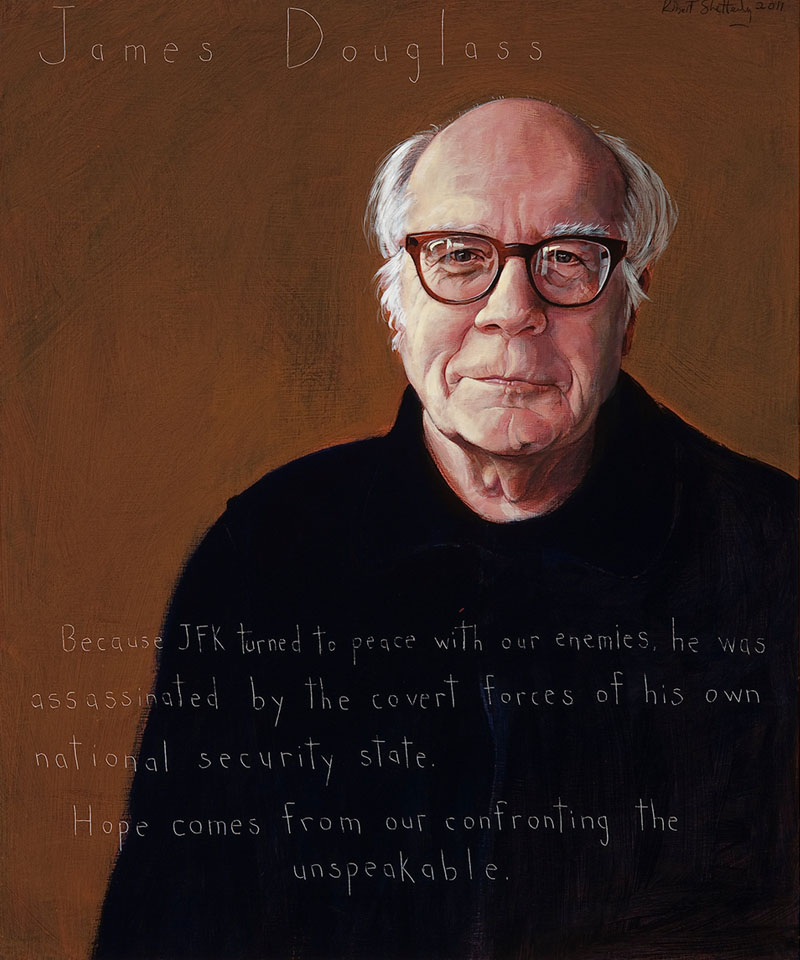
James Douglass
Theologian, Catholic Worker, Writer : b. 1937
“Because JFK turned to peace with our enemies, he was assassinated by the covert forces of his own national security state. Hope comes from our confronting the unspeakable.”
Biography
Raised in a small town in British Columbia and a student in Catholic schools in the United States, James Douglass was awarded an academic scholarship to study nuclear physics at the University of California at Berkeley. He planned to get his degree and then go to work in the nuclear-powered missile industry. But after only two months at UC Berkeley, he experienced an inexplicable emptiness, left college and joined the Army.
After his stint in the Army, Douglass enrolled at Santa Clara University where he sought “the best classes and teachers” with no design for where that would lead him. One place it led him was to English Professor Herbert Burke´s classroom, where Douglass was asked to question the use of nuclear weapons that could destroy the world, and was introduced to the people who were protesting against nuclear weapons, including the Catholic Worker movement and its founder Dorothy Day.
Douglass was moved and influenced by her when she visited Santa Clara. He began to write for The Catholic Worker. Douglass was also deeply influenced by the priest, writer, and social activist Thomas Merton. Douglass was drawn to Merton’s writings about “the Unspeakable”, a term Merton coined in the mid-sixties in response to the soul-shaking events of the time, particularly the assassinations of John F. Kennedy, Martin Luther King Jr., Malcolm X, and Robert F. Kennedy. In those events, Douglass writes, “Merton sensed an evil whose depth and deceit go beyond the capacity of words to describe…When we become more deeply human…the wellspring of our compassion moves us to confront the Unspeakable.”
In the 1960s, he went to the University of Hawaii to teach a course on the theology of nonviolence. He found some of his students so opposed to the Vietnam War that they burned their draft cards and formed a group called The Hawaiian Resistance. Douglass joined the group, and when The Hawaiian Resistance protested a call-up of the Hawaiian National Guard, he was arrested for sitting in the path of a military convoy and went to jail with his students.
In the mid1970s, Douglass and his wife Shelley helped to start a campaign to stop the Trident Submarine and Missile System at the Bangor Trident Base in Kitsap County, WA. The Trident and its sister systems had the capability of launching a first-strike nuclear war without sustaining unacceptable damage in return.
With other peace activists they bought land beside the Trident base and started the Ground Zero Center for Nonviolent Action. “We sought the truth of a nonviolent way of life,” Douglass says, “both personally and politically. Personally we tried to confront our racism, sexism, consumerism — all the isms that allowed us to violate others. Politically, we chose to experiment with nonviolent actions resisting the Trident, a system that seemed to epitomize all the violence of our society.”
Douglass and his fellow activists distributed leaflets in the nearby community and to workers entering the Navy bases. They visited people’s homes to talk about why they wanted the bases to close. They emphasized the religious basis of their views and emphasized that while religions may differ, most have in a common a commitment to nonviolence.
Their work extended to resisting the White Train, which moved nuclear weapons around the country. The Douglasses moved to Birmingham, Alabama, to organize against the White Train but found, once they got there, that the trains were no longer moving nuclear missiles. Following the Gandhian philosophy of letting go of a fixed intention, they remained in the Birmingham area and established Mary’s House, a Catholic Worker hospitality house that provides shelter, food and clothing to those in need. The Douglasses continue to support the homeless and indigent through their work at Mary’s House.
Jim has travelled to Iraq five times, as well as to Israel and Palestine, with peace and justice groups. His goal is to promote peace and to see through the eyes of the people who are often identified as “enemies”. He believes that peoples of different ideologies can discover unity once they realize that they share a common hope for peace and compassion.
The books he has written — The Nonviolent Cross, Resistance and Contemplation, Lightning East to West, and The Nonviolent Coming of God — explore the belief of Jesus, Merton, Gandhi, and King that “if we go as far as we can into the darkness, regardless of the consequences, a midnight truth will free us from our bondage to violence and bring us to the light of peace.” His 2008 book about the assassination of John F. Kennedy, JFK and the Unspeakable, touted as a book that “both records history and makes it”, continues this theme. In its introduction, Jim Douglass writes, “The story of JFK and the Unspeakable is drawn from the suffering and compassion of many witnesses who saw the truth and spoke it. In living out the truth, we are liberated from the Unspeakable.”
Programs
Americans Who Tell the Truth (AWTT) offers a variety of ways to engage with its portraits and portrait subjects. Host an exhibit, use our free lesson plans and educational programs, or engage with a member of the AWTT team or portrait subjects.

Education
AWTT has educational materials and lesson plans that ask students to grapple with truth, justice, and freedom.

Exhibits & Community Engagement
AWTT encourages community engagement programs and exhibits accompanied by public events that stimulate dialogue around citizenship, education, and activism.